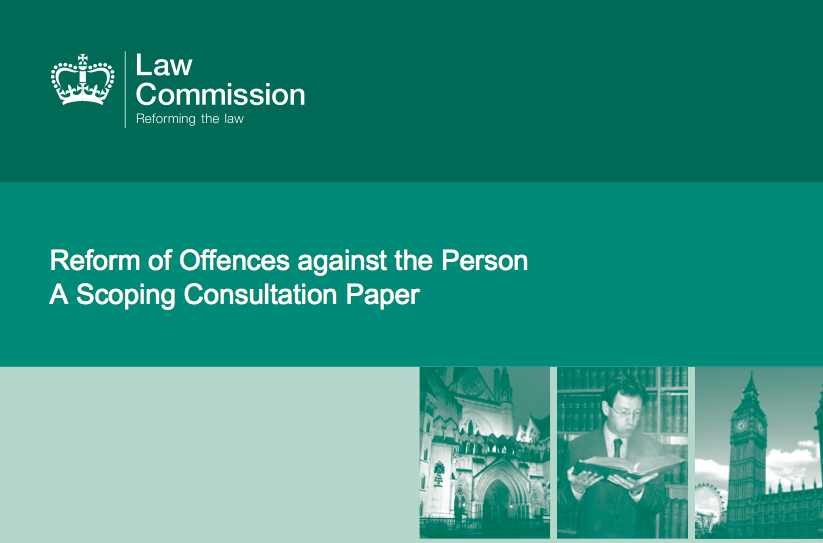
Today was the deadline for responses to the scoping consultation of the reform the Offences Against The Person Act, undertaken by the Law Commission.
This is the law in England and Wales that is currently used to prosecute people living with HIV (and occasionally other sexually transmitted infections; one each so far for gonorrhoea, hepatitis B and genital herpes) for ‘reckless’ or ‘intentional’ transmission, as grievous bodily harm.
The review is extremely thorough for a scoping exercise – i.e. this isn’t the full review, but a review of whether a full review is necessary!
It even spends quite some time highlighting some of the many reasons why overly broad HIV criminalisation is problematic including:
- Difficulties with the current interpretation of subjective recklessness.
- Complexities of proving timing and direction of transmission.
- Appreciating that the people most likely to be a public health threat – those untested and untreated – are not liable under the law.
- Using the criminal law for a public health issue, is “counterproductive in public health terms and contributes to the marginalisation of minority groups”, doing more harm than good.
The paper then offers a ready-made solution, already prepared back in 1998: a draft bill that would make only intentional disease transmission a crime and reverse all the decisions in Dica and Konzani in 2003-5 that resulted in the current legal situation.
- In the draft Bill, clause 15 provides that:(2) Physical injury does not include anything caused by disease but (subject to that) it includes pain, unconsciousness and any other impairment of a person’s physical condition.(4) In its application to section 1 this section applies without the exceptions relating to things caused by disease.Accordingly, the effect of adopting the draft Bill as it stands is that:
- (1) there would be criminal liability for the intentional transmission of disease amounting to serious injury, but
- (2) there would not be criminal liability:
This would reverse the decision in Dica and approximately reinstate the law as it stood in 1998.
- (a) for the reckless transmission of serious disease, or
- (b) for the intentional or reckless transmission of any disease that is not serious.
Nevertheless, it also suggests all kinds of possibilities, including creating a new law that would criminalise non-disclosure, or potential or perceived exposure, just to be balanced. Fortunately, it goes on to suggest that this isn’t necessarily the way forward, despite asking some rather pointed and misleading questions about such an approach in its consultation questions.
- The scoping paper did an excellent job summarising the problems and policy issues relating to the overly broad use of the criminal law in relation to sexual disease transmission (see 6.36-6.58).
- I do not see why, notwithstanding the concerns raised at 6.68 (“it would go further than required to meet [UNAIDS] recommendations”) the wording of the draft Bill could not be adopted as it stands, so as to exclude disease from the definition of injury except for the purposes of the offence of intentionally causing serious injury.
- Given the detailed overview of the problems and policy issues relating to the overly broad use of the criminal law in relation to sexual disease transmission (6.36-6.58), the lack of complete consensus by the minority of “professionals in the relevant fields” does not suggest to me that there needs to be further examination of the “consequences for public health policy and the broader ethical question of whether public health considerations should be the main policy factor.” It is evident to me – and UNAIDS and most other informed, clear thinking experts on this issue – that if the criminal law in this area does not consider public health above and beyond any other consideration (i.e. deterrence, punishment, ethical norm creation) then it does more harm than good.
- So far, England and Wales has led the world in the development of policy in this area (in the absence of legislation limiting the overly broad use of the criminal law) with the creation of prosecutorial and police guidance. It would be disastrous to the global standing of England and Wales as both a leader in pragmatic policy, and in supporting the public health and human rights of developing countries through investment in HIV and health systems via DFID, if the law relating to sexual transmission of disease were expanded to include, for example, prosecutions for non-disclosure or potential or perceived exposure.
HIV Justice Network Law Commission OAPA 1861 Scoping Consultation Response by HIV Justice Network
Read the Law Commission OAPA 1861 Scoping Review: Chapter 6, Disease Transmission